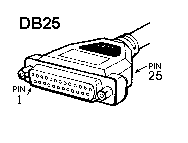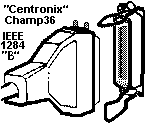Parallel Port Connection |
|
|---|---|
| Workstation end | Printer end |
 |
 In some rare cases, the smaller IEEE 1284 C version may be found here. |
The parallel interface is defined by the IEEE 1284 specification. Unfortunatly IEEE 1284 cables are not all equal. There are IEEE 1284 compatible cables (worst) IEEE 1284 compliant cables (better) and IEEE 1284 - 1994 compliant cables (best).
At the computer or host end, a DB25 connector is used. At the printer
or peripheral end the connector is a centronix or IEEE B connector which
is easy to identify by its large size and wire latch system.

